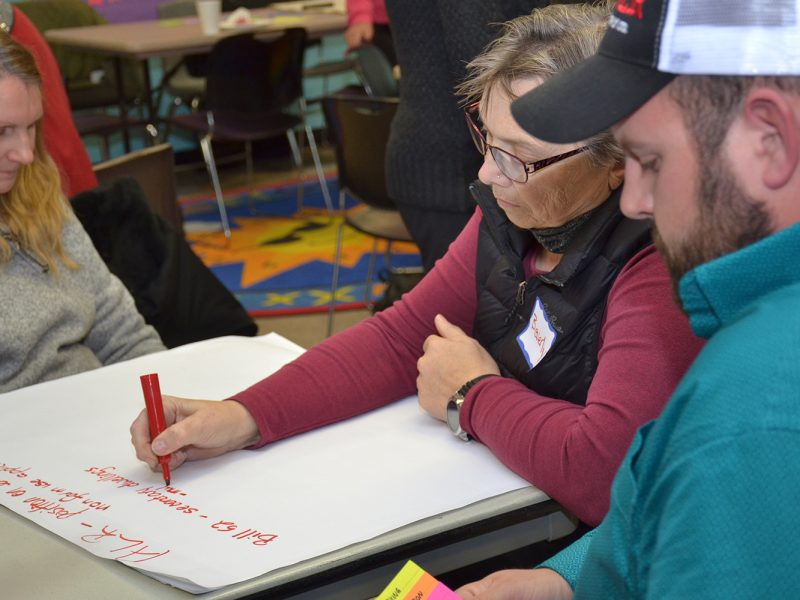PORT ALBERNI – BC farmers’ institutes are calling on the government to review the legislation governing them to ensure it stays responsive to the evolving needs of local farm organizations and rural communities.
Twenty-eight attendees representing 14 farmers’ institutes gathered online for Farmers Institute Day on November 30. The event was organized as part of the Alberni-Clayoquot Regional District System Change Project. Meeting participants discussed the opportunities and challenges institutes face and how the BC Ministry of Agriculture and Food and other funding organizations can better support them.
“Under the Farmers’ and Women’s Institute Act, farmers institutes have a unique and important ability to advise the Minister of Agriculture directly on matters of interest to them,” says project coordinator Heather Shobe. “Local Institutes are cross-sectoral and regionally focused. When they come together from across BC, they can explore and understand more about the issues and opportunities common to all. These are highly important themes that need support from the province.”
About 40 local and three district institutes are incorporated or continued under the farmers and Women’s Institutes Act and subject to the act’s regulations. Some date back to the 1890s while others were formed just this year.
As the province enacts the United Nations Declaration on the Rights of Indigenous Peoples, all provincial legislation is undergoing modernization, which could benefit farmers institutes if a collective voice is at the table to bring issues and solutions forward from across BC.
Priorities
Throughout the meeting, participants also discussed priority areas and what changes they would like to see moving forward.
For example, Clause 26 of the act allows farmers institutes to advise the Ministry of Agriculture and Food directly through an advisory board, but currently no advisory board exists, and the act includes non-descript language around meetings with the minister and allowances for members to attend these meetings.
“The farmers and Women’s Institutes Act already includes a means and mandate to meet directly with the Minister of Agriculture and Food,” Shobe says. “Caution is urged in making changes that would negate that and there needs to be secure structures in place to ensure those meetings happen annually.”
Some farmers institutes would like to see the provincial superintendent of institutes attend their annual meetings.
Former agriculture minister Lana Popham convened two in-person summits of farmers institutes prior to the pandemic, and they have not resumed since.
The current superintendent, Angela Boss, is also steering the province’s consultations with water users, but plans to hold a virtual meeting with all farmers institute members in late February, according to the agriculture ministry.
In addition, farmers institutes want funding and capacity to address their unique regional priorities, not just projects outlined in provincial mandates.
“Current funding streams do not support the regionality of agriculture, and it is critical that a funding stream be open to farmers institutes to have the flexibility to meet the needs of their farmers within their regional context,” says South Island farmers Institute president and agricultural consultant Shellie MacDonald. “For the South Island, that would be land access, farm succession, raising the basic knowledge and skills of emerging farm businesses and expanding market streams.”
Many institutes would like to be more involved in emergency planning and preparedness.
Another common thread raised during the meeting was the lack of communication and collaboration across farmers institutes.
The province hosts [bcfarmersinstitutes.ca], but it is largely out of date, Shobe says.
However, as institutes historically rooted in the agricultural industry, some aspects may not need to change, but could simply use a refresh.
“More information is needed about the rights and structure of farmers institutes,” Shobe says.
She explains that members need to know how they should behave while the public should know how to support and engage with the institutes. Granting organizations need to recognize them as eligible applicants, something that has not always happened.
A how-to document for new institutes could save members a lot of time, MacDonald says, as she recently discovered establishing a new group is not straightforward.
“We really think new and established farmers institutes could benefit from an onboarding document from the ministry, a history of farmers institutes and a copy of the legislation, to give a deeper understanding of the district structure and how they interact with the ministry,” MacDonald says. “We have met some challenges and invested quite a bit of time in discovering the ‘work arounds’ to get to successful outcomes.”


 Spallumcheen cuts, wraps deal for butcher hub
Spallumcheen cuts, wraps deal for butcher hub